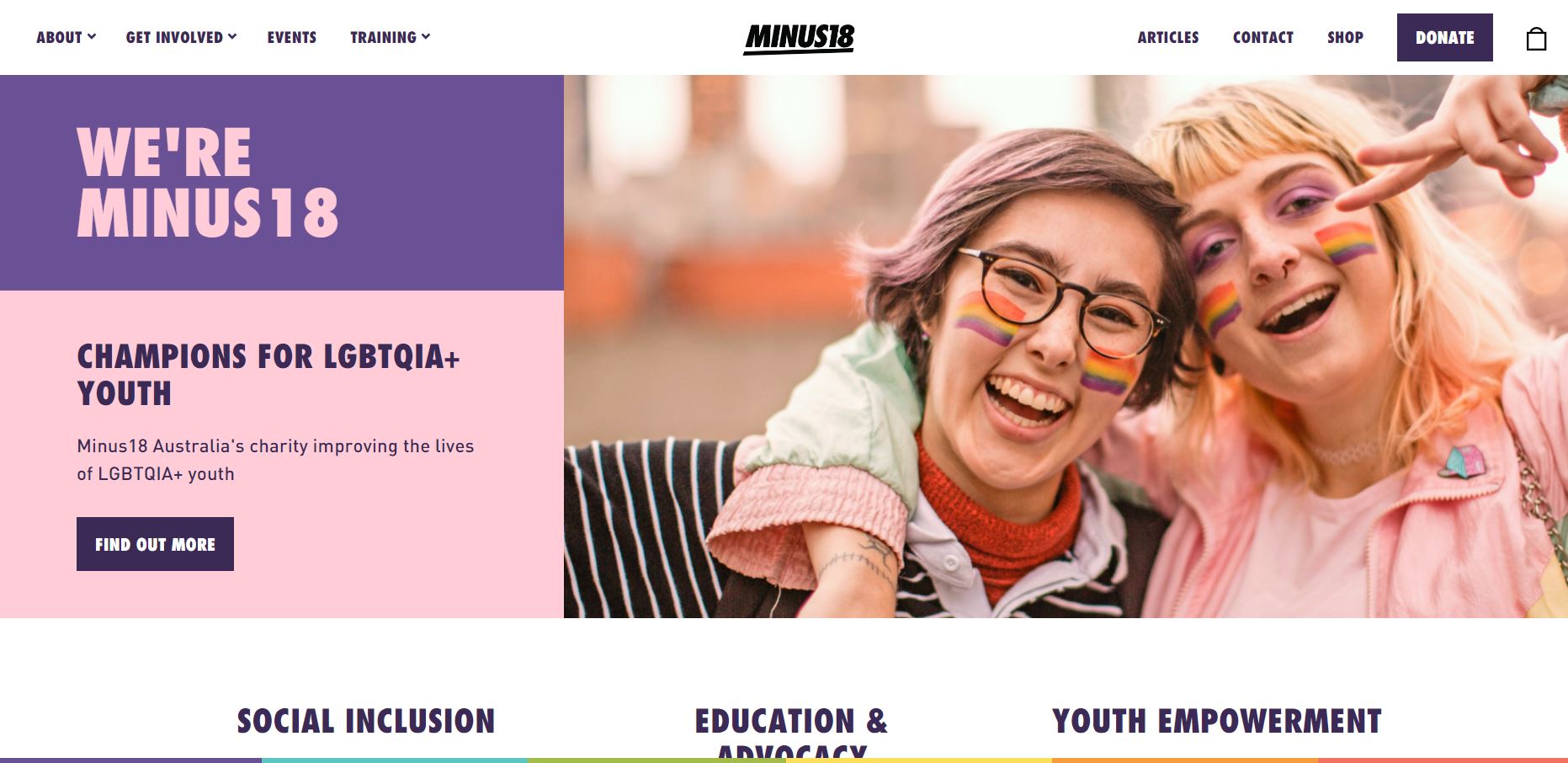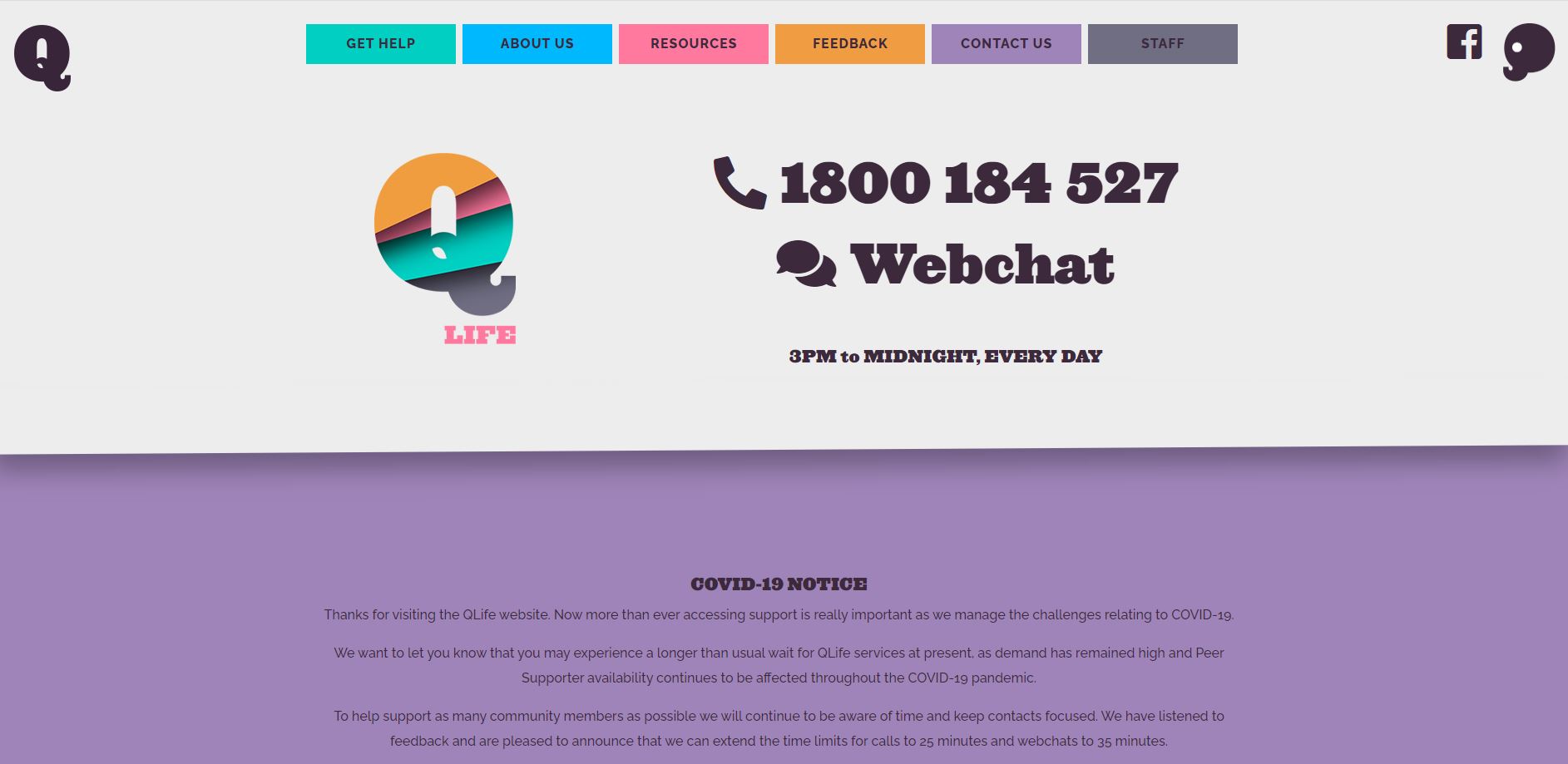Acknowledgment
Whilst we are committed to providing up-to-date information, Finding North recognises that the LGBTIQA+ acronym may undergo changes over time.
We acknowledge that preferred language and terminology are constantly evolving in order to reflect the diverse experiences and identities within the community. Although Finding North will strive to align with the most current and preferred terminology being used within the LGBTIQA+ community, we recognise that our content may not always align and welcome feedback and insights from the community.
Overview
It’s normal for your mental health to change during your life, different experiences, challenges, and how you cope with stress can all affect your mental well-being. Unfortunately, discrimination, bullying, and stigma are still common within the LGBTIQA+ community and can have a significant impact on your emotional and mental health.
In the 2020-21 National Study of Mental Health and Wellbeing, it was reported that
- 44.7% of people who identified as Gay, Lesbian, Bisexual or who used a different term such as Asexual, Pansexual or Queer had a 12-month Anxiety disorder and
- 30.0% people who identified as Gay, Lesbian, Bisexual or who used a different term such as Asexual, Pansexual or Queer had a 12-month Affective disorder.
Looking after your mental health is important but it can be difficult if you are experiencing homophobia, stigma, and discrimination.
Supporting yourself
Looking after your mental health and wellbeing is important. If you haven’t always considered this a priority or are looking for ways to to improve your mental health here are a few things to consider:
You Are Not Alone:
This is probably one of the most important things you need to remember. Although at times you may feel alone or as if no one understands what you are going through you are not alone and many have walked this path.
Make time for you:
It is important to continue to make time to prioritise the things you enjoy in life.
Physical Health and Nutrition:
Good nutrition and adequate exercise both play important roles in looking after your physical and mental health. Eating well not only improves your energy levels but assists in regulating your mood and can help in the prevention and treatment of physical and mental health issues. If you aren’t sure what foods are best for your body a nutritionist or dietician can be helpful. You can also access specialist services through private practice or by GP referral.
Sleep:
Sleep is important and provides your body and mind with a chance to recharge and reset. Sleep is linked to physical and mental health and is there for an important component of self care.
Socialise and Stay Connected:
Coming out can have an impact on your personal relationships. Stay connected to those family members and friends who are supportive. Nurture the positive relationships and give people time to adjust if they need it.
Be Kind to Yourself:
If you are exposed to homophobia, transphobia, stigma or discrimination this can have a negative impact on your mental wellbeing. If you begin to notice that the way you think of yourself or speak to yourself has become negative take a moment, reset. Changing the way you speak to yourself can assist with stress, improve your health and general wellbeing.
Identify any patterns of negative self talk, surround yourself with people who make you feel good and be kind to yourself.
Get Connected:
Connecting with others who are like-minded or going through a similar experience can be helpful. Whether it is through a social group or peer mentoring program, being around and talking with peers can provide you with comfort and guidance. If you aren’t sure where to start QLife provides free peer support as well as a national service directory. QLife’s counselling services are anonymous and available in all States and Territories across Australia.
In the below video from QLife, three individuals share their experiences of coming out as members of the LGBTIQ+ community.
Supporting another person
For some people coming out can bring a sense of relief and for others it can be quite a difficult experience. If someone you know identifies as being part of the LGBTIQA+ community here are a few ways that you can be supportive.
- Use the correct pronouns: show respect by making sure you are using the correct pronoun when speaking to or referring to your family member or friend.
- Listen to the person. Give them the time they need to share with you and be supportive. It can be difficult for some people to share their identity due to fear of discrimination or rejection. Thank them for trusting you.
- Don’t question their truth. Questioning someone’s identity is offensive. This is not about you, accept the person for who they are and be respectful.
- See them as a person. Although gender and sexuality are important parts of their identity there is more to a person. See each person for all the wonderful things that make them who they are.
- Offer your support and keep ask if they would like you to keep the information private. You may be the only person they have told so it is important to respect their privacy.
- If you notice that they are having difficulty with other family members, friends or have experienced bullying or discrimination be there for them. Talk to them about LGBTIQA+ inclusive support services.
How we can help
If you or someone you know is in crisis
If you are worried you may harm yourself or someone else, or need immediate help for someone else in this situation:
Please call 000If you are in distress
Other helplines
- Beyond Blue | 1300 22 4636
- Open Arms – Veterans & Families Counseling | 1800 011 046
- MensLine Australia | 1300 78 99 78
- Defence All Hours Support Line | 1800 628 036
- QLife | 1800 184 527
- 13YARN| 13 92 76
Please select a state you live in
Suicide Call Back Service. Free professional telephone counselling & online chat available at suicidecallbackservice.org.au
Available 24/7
1800RESPECT Domestic Violence Counselling & Support Line. Online Chat at 1800respect.org.au or SMS on 0458 737 732
Available 24/7
13YARN First Nations Peoples Crisis Support Line. Call to talk with an Aboriginal or Torres Strait Islander Crisis Supporter
Available 24/7
Defence All Hours Telephone Support Line. For Australian Defence Force (ADF) members and their families
Available 24/7
Health Direct. Speak to a registered nurse for healthcare advice. healthdirect.gov.au
Available 24/7
Beyond Blue. Online counselling, forums, and webchat - beyondblue.org.au
Available 24/7
Access Mental Health Line. For people who have concerns about their own, or someone else’s mental health
Available 24/7
Medicare Mental Health Centre Canberra. Phone, request a call canberrammhc.com.au.
Monday, Wednesday & Friday: 8.30am-5:00pm. Tuesday & Thursday (extended hours): 8:30am-7:00pm
NSW Hospital and Health Services State-wide Mental Health Line. Speak to a trained Mental Health Professional
Available 24/7
Medicare Mental Health. Phone to find your nearest centre. Support through Medicare Mental Health Centres are free. No appointment or GP referral is required. Visit www.medicarementalhealth.gov.au
Hours vary.
NT Mental Health Line. For people who have concerns about their own, or someone else’s mental health. Speak to a trained mental health professional.
Available 24/7
Darwin Medicare Mental Health. Clinical Assessment and Treatment. Call, walk-in (16 Scaturchio St, Casuarina.)
Mon - Wed and Fri: 9am - 9pm; Thur: 1pm - 9pm; Sat - Sun (and public holidays): 12pm - 8pm
13 HEALTH. A confidential phone service that provides health advice. Call to talk to a registered nurse.
Available 24/7
1300 MH Call. A confidential mental health telephone triage service providing information, advice and referral.
Available 24/7
Medicare Mental Health. Phone to find your nearest centre. Support through Medicare Mental Health Centres are free. No appointment or GP referral is required. Visit www.medicarementalhealth.gov.au
Hours vary.
SA Mental Health Triage. A confidential mental health telephone service, staffed by mental health clinicians, providing information, advice and referral.
Available 24/7
Urgent Mental Health Care Centre (UMHCC) located at 215 Grenfell Street, Adelaide, offers an alternative to presenting at hospital Emergency Departments for a mental health crisis.
Available 24/7
Medicare Mental Health. Phone to find your nearest centre. Support through Medicare Mental Health Centres are free. No appointment or GP referral is required. Visit www.medicarementalhealth.gov.au
Hours vary.
LETSS Lived Experience Telephone Support Service (Adelaide Metro). letss.org.au
5pm - 11:30pm, 365 days a year
Access Mental Health- Helpline Triage offering phone counselling, information and referral.
9am - 10pm
Medicare Mental Health. Phone to find your nearest centre. Support through Medicare Mental Health Centres are free. No appointment or GP referral is required. Visit www.medicarementalhealth.gov.au
Hours vary.
Victoria Psychiatric Triage providing an initial assessment and identifies whether a person needs further assessment or referral.
Available 24/7
Geelong Head to Health. Call or walk-in at 8 Station Street, Norlane.
Monday–Friday, 12pm–9pm and Saturday–Sunday/public holidays, 1pm – 6pm
Medicare Mental Health. Phone to find your nearest centre. Support through Medicare Mental Health Centres are free. No appointment or GP referral is required. Visit www.medicarementalhealth.gov.au
Hours vary.
Rurallink - An after-hours telephone service for people in rural and regional WA experiencing a mental health crisis
Weeknights 4:30pm-8:30am / 24hrs on Weekends and Public Holidays
Peel -Mental Health Emergency Response Line. Call to speak with a trained mental health clinician. Callers referred to acute response teams.
Available 24/7
TTY - Mental Health Emergency Response Line.Call to speak with a trained mental health clinician. Callers referred to acute response teams.
Available 24/7
Metro - Mental Health Emergency Response Line. Call to speak with a trained mental health clinician. Callers referred to acute response teams.
Available 24/7
Medicare Mental Health. Phone to find your nearest centre. Support through Medicare Mental Health Centres are free. No appointment or GP referral is required. Visit www.medicarementalhealth.gov.au
Hours vary.
Please select a state you live in
Service Options
**** *****
**** ***** * *********** *********** ***
**** ***** ********* *****
**** ***** * *********** *********** ***
**** ***** ********* *****
**** ***** * *********** *********** ***
**** ***** ********* *****
**** ***** * *********** *********** ***
**** ***** ********* *****
**** ***** * *********** *********** ***
**** ***** ********* *****
**** ***** * *********** *********** ***
**** ***** *****





